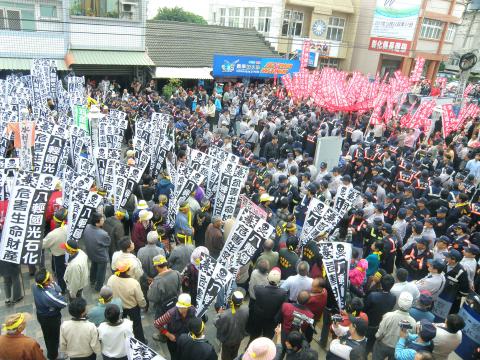Hundreds of supporters and opponents of a controversial plan to build a petrochemical complex in Changhua County clashed yesterday as the government held a public hearing on the project.
The two opposing forces used poles and protest banners to poke at each other outside Dacheng Township (大城) Hall in Changhua County in the hours before the hearing.
The clashes were sparked when a supporter of the project took exception to a fake coffin being held by opponents of the complex and tried to damage it.

PHOTO: LIU HSIAO-HSIN, TAIPEI TIMES
After they were separated by police, the two camps continued to trumpet their respective views via campaign trucks that were driven to the scene.
By the time the Ministry of Economic Affairs’ meeting on the NT$600 billion (US$20 billion) project began, the brawl had petered out, with no injuries reported.
Local police said between 400 and 500 protesters were present, while 500 officers were dispatched to the scene.
Inside the hall, sporadic quarrels also broke out between supporters and opponents of the project. The hearing ended without reaching any conclusion.
The complex is being proposed by Kuokuang Petrochemical Technology Co (KPTC, 國光石化科技), a joint venture between state-owned oil refiner CPC Corp, Taiwan (CPC, 台灣中油) and several private companies.
The project has been under consideration since the 1990s. Since it was first proposed, the site of the complex has been changed several times because of strong objections from local residents.
KPTC initially planned to invest up to NT$400 billion to construct a 4,000 hectare petrochemical complex on Changhua County’s coastal wetlands near the estuary of the Jhuoshui River (濁水溪). However, rising material costs increased the overall budget of the project.
The first phase is scheduled to be completed in 2016 and could help boost economic growth significantly, the project’s backers say.
The ministry says the project would generate revenue of about NT$460 billion and create 18,000 jobs directly and 357,000 jobs indirectly.
However, environmentalists have argued that the facility would cause irreversible damage to the area’s ecosystem, which includes migratory birds, fiddler crabs, mudskippers, mud shrimps and the endangered Indo-Pacific humpback dolphin.
Early last month, nearly 10,000 people from more than 200 groups nationwide took to the streets in Taipei, demanding that the government halt expansion of the petrochemical industry.

AIR SUPPORT: The Ministry of National Defense thanked the US for the delivery, adding that it was an indicator of the White House’s commitment to the Taiwan Relations Act Deputy Minister of National Defense Po Horng-huei (柏鴻輝) and Representative to the US Alexander Yui on Friday attended a delivery ceremony for the first of Taiwan’s long-awaited 66 F-16C/D Block 70 jets at a Lockheed Martin Corp factory in Greenville, South Carolina. “We are so proud to be the global home of the F-16 and to support Taiwan’s air defense capabilities,” US Representative William Timmons wrote on X, alongside a photograph of Taiwanese and US officials at the event. The F-16C/D Block 70 jets Taiwan ordered have the same capabilities as aircraft that had been upgraded to F-16Vs. The batch of Lockheed Martin

GRIDLOCK: The National Fire Agency’s Special Search and Rescue team is on standby to travel to the countries to help out with the rescue effort A powerful earthquake rocked Myanmar and neighboring Thailand yesterday, killing at least three people in Bangkok and burying dozens when a high-rise building under construction collapsed. Footage shared on social media from Myanmar’s second-largest city showed widespread destruction, raising fears that many were trapped under the rubble or killed. The magnitude 7.7 earthquake, with an epicenter near Mandalay in Myanmar, struck at midday and was followed by a strong magnitude 6.4 aftershock. The extent of death, injury and destruction — especially in Myanmar, which is embroiled in a civil war and where information is tightly controlled at the best of times —

Taiwan was ranked the fourth-safest country in the world with a score of 82.9, trailing only Andorra, the United Arab Emirates and Qatar in Numbeo’s Safety Index by Country report. Taiwan’s score improved by 0.1 points compared with last year’s mid-year report, which had Taiwan fourth with a score of 82.8. However, both scores were lower than in last year’s first review, when Taiwan scored 83.3, and are a long way from when Taiwan was named the second-safest country in the world in 2021, scoring 84.8. Taiwan ranked higher than Singapore in ninth with a score of 77.4 and Japan in 10th with

SECURITY RISK: If there is a conflict between China and Taiwan, ‘there would likely be significant consequences to global economic and security interests,’ it said China remains the top military and cyber threat to the US and continues to make progress on capabilities to seize Taiwan, a report by US intelligence agencies said on Tuesday. The report provides an overview of the “collective insights” of top US intelligence agencies about the security threats to the US posed by foreign nations and criminal organizations. In its Annual Threat Assessment, the agencies divided threats facing the US into two broad categories, “nonstate transnational criminals and terrorists” and “major state actors,” with China, Russia, Iran and North Korea named. Of those countries, “China presents the most comprehensive and robust military threat